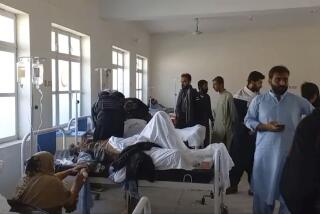Pakistani city draws inward after attack
- Share via
LAHORE, PAKISTAN — The residents of this city of cafes, culture and good food always thought they were different.
Even when a few suicide bombers targeted the metropolis starting a couple of years back, most considered themselves relatively insulated from the worst of Pakistan’s problems, the violence over the horizon in outlaw country near the Afghan border.
Residents consider Lahore the arts capital of Pakistan and feel proud of its free, open atmosphere, its tolerance, sense of fun and vibrant street life. It’s the home of Pakistan’s Lollywood, the nation’s film capital.
But Tuesday’s brazen attack on the visiting Sri Lankan cricket team has shaken the residents of this city of 10 million people.
The gun and grenade assault left seven people dead, not eight as initially reported, officials said. Six of the dead were policemen.
Saleem Kashmiri stood Thursday in the Liberty traffic circle where the attack occurred. Kashmiri, the principal of an elite high school, had several of his uniformed students in tow. He was visibly shaken as he contemplated the mound of flowers, the pictures of those killed, the ribbons and placards of sympathy, the periodic chants by angry citizens.
“Enough is enough,” he said. “We are very, very upset. We understand the problems up there in the northern frontier. But this is Lahore, a place of culture and fun-loving people.”
Under heavy pressure to show results, authorities Thursday issued four police sketches and claimed to have identified the heavily armed attackers, although they did not announce any arrests.
The dozen or so militants melted into the city after the attack. Video appeared to show them leaving calmly with little fear of pursuit. Some observers said police officers were ineffective and that some may have fled.
We were left “like sitting ducks,” cricket match referee Chris Broad told a news conference in Manchester, England, after flying home. The militants should have been killed by specially trained police within three seconds, former President Pervez Musharraf told reporters.
“We know all our police,” countered Mohammed Zafar Iqbal, a member of the Elite Force, at the traffic circle Thursday morning as he paid homage to his fallen colleagues. “None were the type who would run away.”
Traffic was noticeably light, the sidewalks relatively empty.
At a real estate office 30 feet from the roundabout, Mian Azhar Saeed placed his finger in the bullet holes marking the walls.
His plate glass windows have been replaced, but his sense of shock isn’t likely to go away any time soon.
Saeed has decided to spend minimal time in public -- work, home and a very occasional trip to the shops.
“No more window shopping,” he said. “No theaters or movies. The only public place people keep going to is the mosque. There’s less fear of that than dying in a theater or shopping mall.”
At Al-Fazal Restaurant on Abbot Road, the usual lunchtime crowd was absent.
“Look, there’s no business,” said owner Malik Pervaiz, pointing at three customers munching on lamb. “This is a microcosm of Lahore -- it’s the same everywhere.”
Maqsood Ahmad, 45, a driver for a local company, took his food back to the office. Co-workers used to come out together for a leisurely meal, he said. Now everyone buys their food on the run and eats in the office. “It’s safer,” he said before rushing off. “I’m scared. Everyone’s scared.”
Several Lahore residents blamed President Asif Ali Zardari and political rival Nawaz Sharif for the attack. The two have engaged in a blistering political battle in recent weeks, with the president banning Sharif from holding office and Sharif counter-threatening a massive protest march and sit-in.
“Both Zardari and Sharif are acting like landlords, obsessed with their own interests and not the people’s,” said Saeed. “There’s no leadership. If they can’t solve their personal problems, how can they fight these attackers?”
There was also defiance and resolve to move on.
“If terrorists want to make people afraid, this won’t happen,” said Sohali Kahn, a film producer. “If they try this again, I believe citizens will fight back.”
Also weighing on many people this week was the fact that the attack was directed at guests in a society that prides itself on honor and hospitality.
“Dear Lankans, we are sorry for every Pakistani,” was written in English and Urdu on a poster tied to a tree on a busy boulevard a few miles from the roundabout.
Especially embarrassing was the idea that the Sri Lankan team agreed to play after other national teams shunned the country as too dangerous.
“The fact that someone attacked our guests is unthinkable,” said Kashmiri. “Our culture says if you don’t have enough food, you go without and give it to them. This is a nightmare to think what could’ve happened. We condemn this from the bottom of our hearts.”
--
--
Special correspondent Aoun Sahi contributed to this report.
More to Read
Sign up for Essential California
The most important California stories and recommendations in your inbox every morning.
You may occasionally receive promotional content from the Los Angeles Times.













